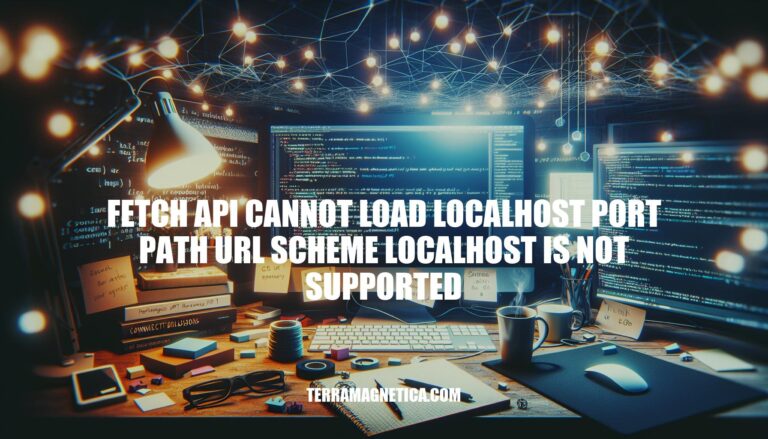


The error message “Fetch API cannot load localhost: URL scheme ‘localhost’ is not supported” occurs when developers attempt to make HTTP requests to a local server using the Fetch API without specifying the protocol (e.g., http://). This issue is common during development when testing APIs on a local machine. It highlights the importance of correctly formatting URLs to ensure successful communication between the client and server.
The error “Fetch API cannot load localhost: URL scheme ‘localhost’ is not supported” occurs when the URL used in the fetch request does not include the protocol (e.g., http:// or https://). Here are the specific conditions and examples:
Missing Protocol:
localhost:5000 instead of http://localhost:5000.// Incorrect
fetch('localhost:5000/users')
// Correct
fetch('http://localhost:5000/users')
Using localhost as URL Scheme:
fetch function interprets localhost as the URL scheme instead of the domain.// Incorrect
fetch('localhost:3000/api/data')
// Correct
fetch('http://localhost:3000/api/data')
SSL Certificate Usage:
https://.// Incorrect
fetch('localhost:5000/users')
// Correct
fetch('https://localhost:5000/users')
CORS Issues:
// Server-side configuration needed to allow CORS
const cors = require('cors');
app.use(cors());
These conditions typically arise during local development when making HTTP requests to a backend server running on localhost. Always ensure the protocol is specified to avoid this error.
The error “Fetch API cannot load localhost. URL scheme ‘localhost’ is not supported” typically occurs because the Fetch API requires a complete URL, including the protocol (e.g., http:// or https://). When you use localhost without specifying the protocol, the Fetch API interprets localhost as the URL scheme, which is invalid.
fetch('localhost:5000/users') instead of fetch('http://localhost:5000/users').localhost alone does not meet this requirement.https://) or not (http://).By always specifying the protocol, you ensure that your requests are correctly formatted and understood by the Fetch API, avoiding common pitfalls and errors.
To resolve the ‘fetch API cannot load localhost port path URL scheme localhost is not supported’ error, follow these detailed solutions and workarounds:
Ensure you include the http:// or https:// protocol in your fetch request.
Incorrect:
const response = await fetch('localhost:5000/users');
Correct:
const response = await fetch('http://localhost:5000/users');
const data = await response.json();
console.log(data);
If your backend is running on a different port, specify it correctly in the URL.
Example:
const response = await fetch('http://localhost:8088/api/login', {
method: 'POST',
headers: {
'Content-Type': 'application/json'
},
body: JSON.stringify({
username: 'yourUsername',
password: 'yourPassword'
})
});
const data = await response.json();
console.log(data);
Ensure Cross-Origin Resource Sharing (CORS) is enabled on your server. This allows your frontend to communicate with your backend.
Example for Express.js:
const express = require('express');
const cors = require('cors');
const app = express();
app.use(cors());
app.get('/users', (req, res) => {
res.json([{ id: 1, name: 'John Doe' }]);
});
app.listen(5000, () => {
console.log('Server is running on port 5000');
});
If you are using a development server like Webpack, you can set up a proxy to redirect API calls to your backend.
Example for Webpack Dev Server:
module.exports = {
devServer: {
proxy: {
'/api': 'http://localhost:8088'
}
}
};
Ensure there are no typos in your URL, such as misspelling localhost.
Incorrect:
const response = await fetch('loaclhost:5000/users');
Correct:
const response = await fetch('http://localhost:5000/users');
http:// or https://).By following these solutions and best practices, you can effectively resolve the ‘fetch API cannot load localhost port path URL scheme localhost is not supported’ error and avoid similar issues in the future.
Missing Protocol: Forgetting to include http:// or https:// in the URL.
fetch('localhost:5000/users') instead of fetch('http://localhost:5000/users').Incorrect Port Configuration: Using the wrong port number or not specifying the port at all.
CORS Issues: Not handling Cross-Origin Resource Sharing (CORS) properly.
Always Specify the Protocol: Ensure you include http:// or https:// in your fetch requests.
fetch('http://localhost:5000/users').Check Port Numbers: Verify the port number your server is running on and use it in your requests.
fetch('http://localhost:8080/api/login').Enable CORS: Configure your server to handle CORS requests.
By addressing these common mistakes, you can avoid the ‘fetch api cannot load localhost port path url scheme localhost is not supported’ error and ensure smoother development.
occurs when making requests to a local server using the Fetch API, typically due to missing or incorrect protocol specification, port configuration issues, or CORS problems.
To resolve this issue, developers can use a proxy, check for typos in URLs, and follow best practices such as specifying the protocol, ensuring CORS is properly configured, using environment variables, and validating URLs and paths.
include forgetting to include ‘http://’ or ‘https://’ in the URL, incorrect port configuration, and not handling CORS properly. To prevent these errors, developers should always specify the protocol, check port numbers, and enable CORS on their server.
By understanding and correctly handling this error, developers can ensure smoother development and avoid similar issues in the future.